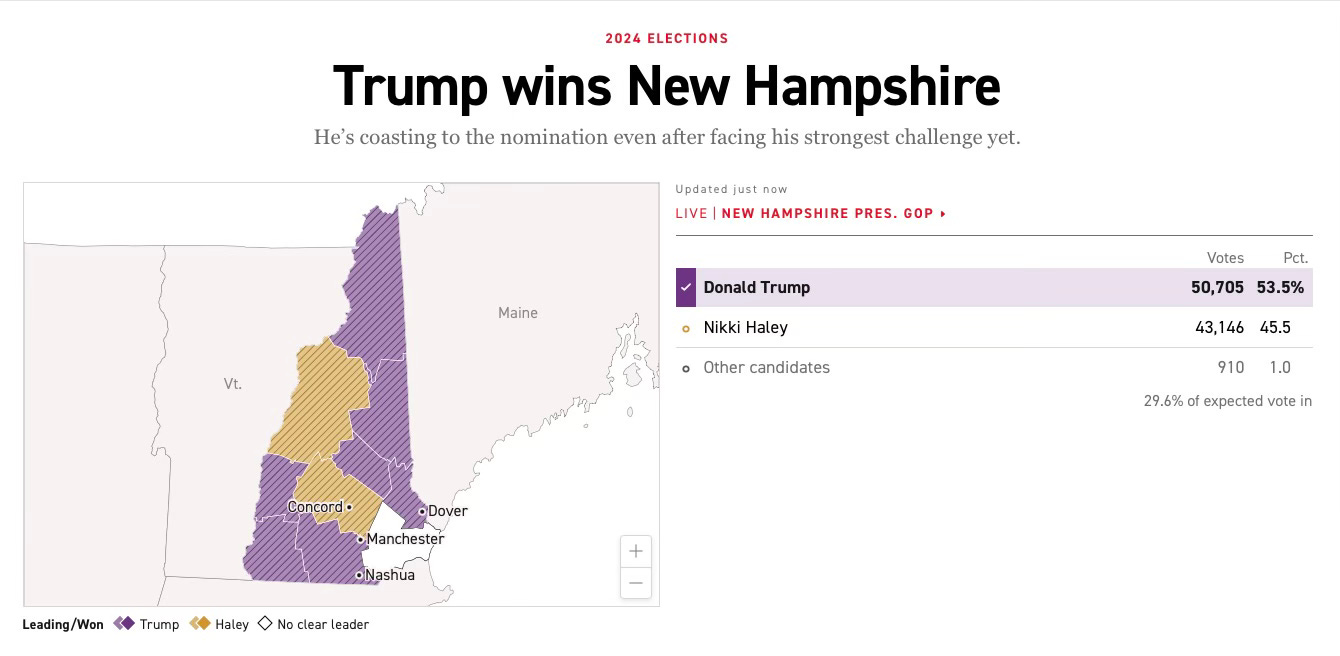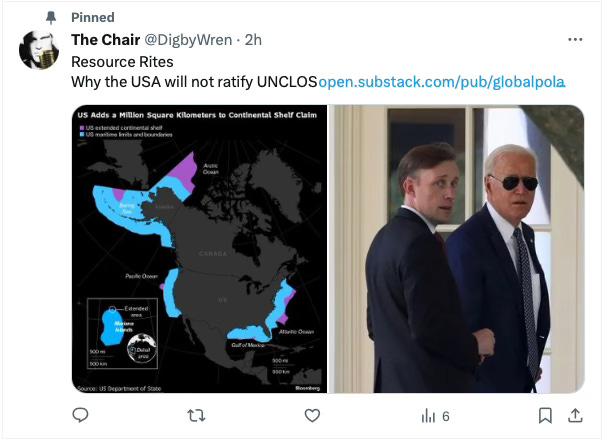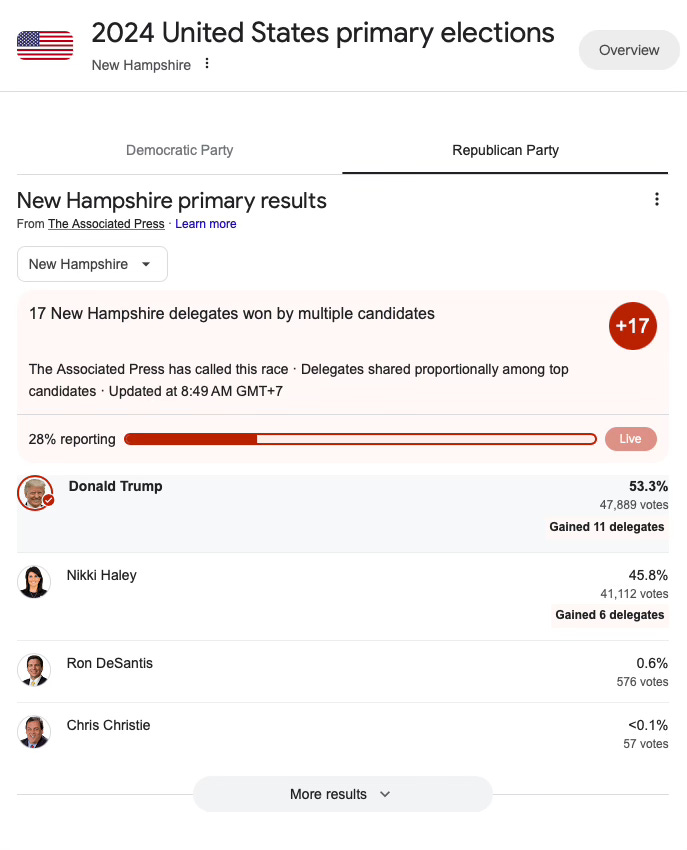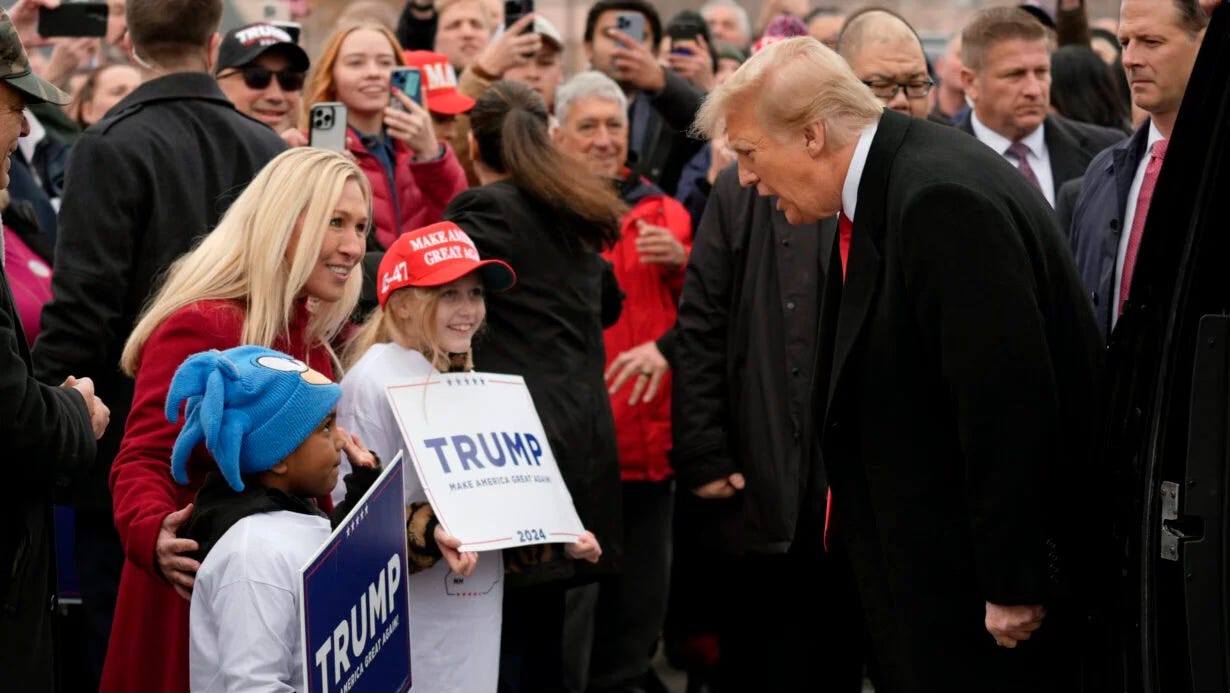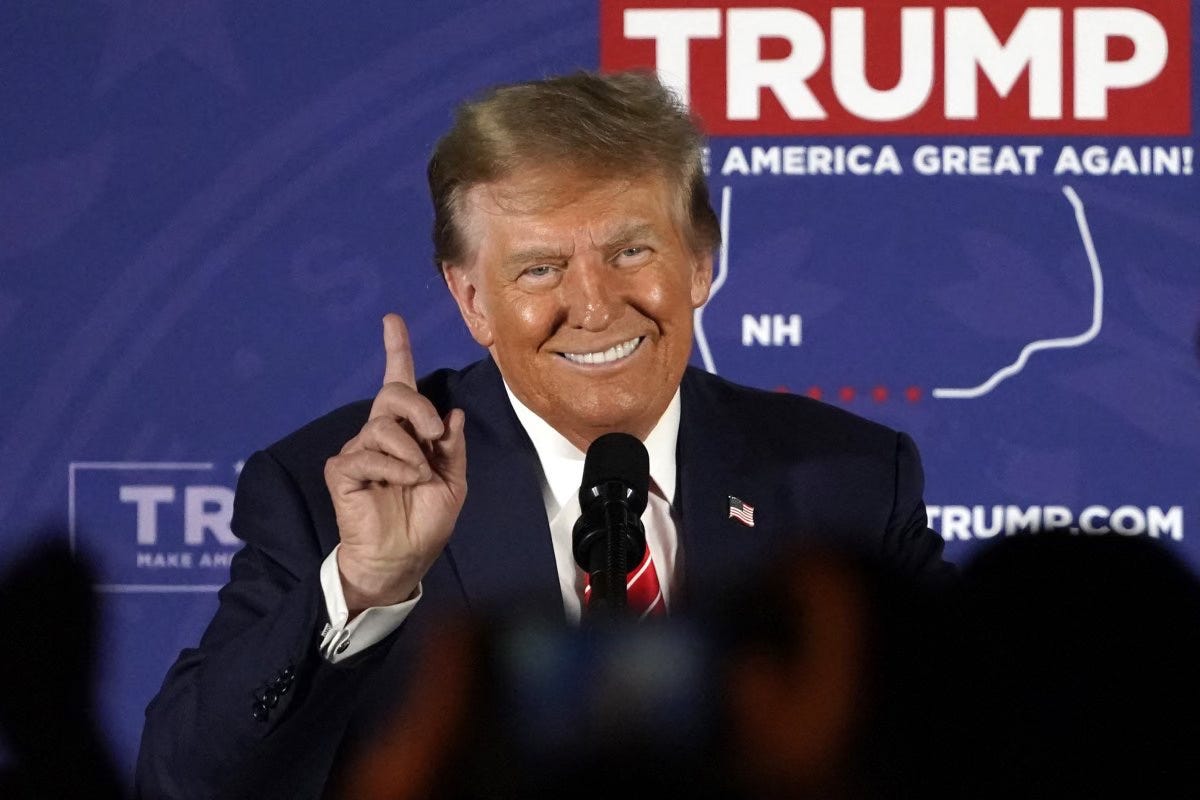Trumpets Blare in New Hampshire
Trump’s commanding victories, 24th China-EU Summit, late 2023 offered hope for a paradigm shift in China-West relations, Former president Trump outperformed his competitors in primary race.
UPDATE: Trump’s commanding victories in the earliest-voting states all but extinguished any remaining doubt that he is fully in control of the Republican Party, even as he remains enmeshed in civil and criminal trials in multiple jurisdictions.
In New Hampshire's initial Republican primary, Donald Trump emerged victorious on Tuesday. Securing his second consecutive triumph in the race for the 2024 GOP nomination, the former president outperformed his competitors with a decisive victory in Iowa. Meanwhile, GOP contender Nikki Haley was unable to leverage her appeal among independent and anti-Trump voters who are seeking a new leader for the party.
In the wake of the recent China-US summit and the 24th China-EU Summit, late 2023 offered hope for a paradigm shift in China-West relations. As we navigate through the complexities of these diplomatic milestones, a nuanced understanding emerges, offering insights into the past, present, and future of this crucial relationship.
Trump wins New Hampshire
He’s coasting to the nomination even after facing his strongest challenge yet.
Trump’s commanding victories in the earliest-voting states all but extinguished any remaining doubt that he is fully in control of the Republican Party, even as he remains enmeshed in civil and criminal trials in multiple jurisdictions.
In recent weeks Haley effectively staked her candidacy on New Hampshire, where she earned the support of the popular governor, Chris Sununu, and the storied Union Leader newspaper. The former UN ambassador tried to appeal to Trump-weary independent and moderate voters by calling the former president an agent of “chaos.” But it ultimately wasn’t enough.
Trump moved aggressively in recent days to spotlight the support he has received from prominent Republicans, looking to convey that the party is rallying around him. On the eve of the primary, he campaigned in Laconia with three former rivals-turned-supporters — Sen. Tim Scott (R-S.C.), North Dakota Gov. Doug Burgum and Vivek Ramaswamy. And this week, he won the support of his former arch nemesis, Florida Gov. Ron DeSantis, who dropped out of the race and endorsed the former president.
“Nikki Haley said she’s running to stop the reelection of Harris-Biden. Yet, without a viable path to victory, every day she stays in this race is another day she delivers to the Harris-Biden campaign. It’s time for unity, it’s time to take the fight to the Democrats, and for Nikki Haley: it’s time to drop out,” Taylor Budowich, CEO of the Trump super PAC Make America Great Again Inc., said in a statement after the race was called.
On Saturday night, Trump was joined onstage at a rally by nearly every major statewide Republican from South Carolina, Haley’s home state.
The contest now turns to Nevada, where Trump is running essentially unopposed in next month’s caucuses. From there, it will head to South Carolina, where polls show him with a wide lead.
Read more here.
Donald Trump wins New Hampshire's Republican primary, rematch with Biden likely
By Times of India
In New Hampshire's initial Republican primary, Donald Trump emerged victorious on Tuesday. Securing his second consecutive triumph in the race for the 2024 GOP nomination, the former president outperformed his competitors with a decisive victory in Iowa. Meanwhile, GOP contender Nikki Haley was unable to leverage her appeal among independent and anti-Trump voters who are seeking a new leader for the party.
The primaries in New Hampshire stand out due to the participation of undeclared voters—individuals without affiliation to any political party—who have the flexibility to vote in the primary of either party. This feature attracts voters who may not strictly adhere to party lines.
Although the exact margin remains uncertain, the outcomes are expected to intensify demands from certain Republicans for Haley to withdraw from the competition.
Nevertheless, her campaign team pledged in a Tuesday memo to persevere until "Super Tuesday" in early March, when 16 states cast their votes simultaneously.
The forthcoming primary is set for February 24 in South Carolina, Haley's birthplace and where she completed two terms as governor. Despite her connections to the state,
Trump has secured support from the majority of South Carolina's Republican leaders, and opinion polls indicate he holds a substantial lead.
Trump secured a resounding triumph in Iowa's initial Republican showdown last week, leaving Haley significantly behind in third place. The once bustling roster of 14 contenders dwindled to a direct contest on Sunday when Florida governor Ron DeSantis withdrew after clinching second place in Iowa. Historically, no Republican has clinched the first two primaries without eventually winning the party's nomination.
Despite minimal on-ground campaigning in New Hampshire, Trump's strategy—a blend of personal complaints and conservative cultural rhetoric—has garnered him a commanding lead in the polls. Trump has voiced a baseless allegation that Democrats are permitted to participate in the Republican primary. Nonetheless, independents can cast their votes, and Haley is optimistic they will reject Trump, viewing her as a more centrist choice.
Throughout the week, she emphasised, supported by survey data, that the majority of Americans are opposed to a Trump-Biden rematch. Joe Biden also won New Hampshire's Democratic primary even though he wasn’t on the ballot. His supporters mounted a write-in campaign on his behalf to avoid a loss, even though the contest awards no delegates because it violates the national party rules he pushed for.
Read more here. (With inputs from agencies)
China-West Relations in Potential Paradigm Shift
January 09, 2024
About the author:
Wang Zaibang, Senior Fellow of Taihe Institute
Introduction:
In the wake of the recent China-US summit and the 24th China-EU Summit, late 2023 offered hope for a paradigm shift in China-West relations. As we navigate through the complexities of these diplomatic milestones, a nuanced understanding emerges, offering insights into the past, present, and future of this crucial relationship.
"Man must evolve for all human conflict a method which rejects revenge, aggression, and retaliation."1
- Martin Luther King Jr.
In late 2023, two significant diplomatic events unfolded. The first took place at the China-US summit in Woodside on November 15, followed by the 24th China-EU Summit in Beijing on December 8.2 Against a turbulent background in China-US and China-EU relations over last few years, these events signal a potential paradigm shift, prompting a closer examination of China-West relations.
The Past as the Present
Reflecting on the past, we must consider the lens through which we evaluate Chinese bilateral relations with the US, EU, and the West as a whole. It seems reasonable to regard the two summits and the possible subsequent improvements in bilateral relations as outcomes of complicated strategic competition fueled by a more aggressive US foreign policy in economic, political, and technological arenas.
A series of US de-risking policies, technological protectionism, and a trade war strained China-US relations. Puzzlingly, these policies did little to service mainstream US economic and foreign policy interests. Conversely, sanctions and blockades pushed Chinese public and private actors to seek new avenues and partners, to the detriment of the US hegemony.
Despite this negativity, there have also been recent developments towards peace and compromise. At the Filoli Estate in Woodside, California, reaffirming the five commitments he made at the Bali summit, US President Joe Biden said that the US does not seek a new Cold War, it does not seek to change China's system, it does not seek to revitalize alliances against China, it does not support "Taiwan independence," and that it has no intention to have a conflict with China.3
Later, during the China-Europe summit in Beijing, both Charles Michel, President of the European Council, and Ursula von der Leyen, President of the European Commission, conveyed optimism regarding future development of China-EU relations. Stressing the importance of these relations, they emphasized the EU's commitment to avoiding decoupling from China and expressed interest in building a long-term, stable, and sustainable relationship.4
These summits and other developments seem to indicate a thaw in China's relations with the West after years of collisions, friction, probing, and bottoming out.
Modern Context
In the contemporary context, understanding the essence of China-West relations at this tentative new stage raises two key points. On the one hand, this phase is not a simple return to the pre-Trump era. In Western perceptions of China, two elements persist: a constant and a change. The constant is that most Western nations still view China through a static ideological lens, and hold the misconception stemming from a Cold War-era mentality that simplifies complex interactions and cultures into a binary paradigm. The change refers to China's power position. Through four decades of development, China has become a pivotal world power, which has fueled "China threat theory" and other hawkish paradigms in pessimistic minds. Both the constant perception and the change in China's power make it increasingly challenging for Western countries to approach China with the same calm mindset they had prior to 2018.
On a more optimistic note, relations between China and Western nations post-summits stopped deteriorating and regained a semblance of stability. Current US policy seems to signal a less aggressive tone, but the duration of this shift, whether it is a temporary calm incentivized by a US presidential election year, remains unclear.
Qualms and calms aside, the reality is that China is too big a part of the multipolar world to exclude. At this juncture, attempts to contain China simply create a mutually assured loss scenario for all involved. How much longer the US will maintain a more conciliatory tone is unclear, but regardless of foreign policy, the simple reality is that China is here to stay. An interesting piece of this puzzle are the opinions of European-origin nations nominally aligned with the US, but who may seek more non-confrontational approaches with China, including Australia under new Prime Minister Anthony Albanese and France under President Emmanuel Macron.5
If we could characterize the relationship between China and the US before the two summits as the US on offense and China on defense, we could characterize the current relationship as a strategic stalemate. The upcoming 2024 US elections likely factor into this outcome. US politicians seeking office will attempt to harness anti-China sentiment, whilst simultaneously presenting themselves as both peacemakers and as economy-first candidates for the average Americans. We will likely see some turbulence, reversals, and instability in US rhetoric regarding China next year as these contradictory paradigms clash.
Considering this instability, certain predictions can be made. The US administrative authorities and Congress might take contradictory actions to disrupt China while ensuring overall control. The Biden administration is unlikely to drop technological sanctions against China. With the restoration of military communications between China and the US as a safety net, there may even be an increase in frictions in the waters surrounding China. In a word, China-US relations are at a strategic stalemate, with no significant or substantial improvements expected in the next year as the US prepares for a volatile 2024 presidential election.
Eyes on the Future
Looking ahead, it is essential to clarify certain major stances to chart a way forward for China-West relations.
Firstly, the US-led Western bloc must formulate their policies towards China based on the undeniable reality of economic interdependence among the countries, which has also been supported by theories including "division of labor" and "market economy." Attempts to divide the world into binary factions reflect a cynical Cold War mentality, a paradigm which does a disservice to the entire world with narrowed supply chains and increased transaction cost. More and more people have recognized China's pivotal position in the world, and realized that decoupling with China is not a feasible option, economically or geopolitically.
Secondly, while competition between China and the West is inevitable, it is crucial to distinguish between constructive and destructive competition. Examples of constructive competition include enhancing educational facilities, optimizing industrial structures, and creating innovative technology, all of which provide existential value. Destructive competition, on the other hand, includes disruption of global supply chain, engaging in protectionism, initiating proxy wars, and other "net negative" actions that seek to jam competitors for shortsighted gains. In the long run, pursuit of destructive competitive tactics will backfire not only on the initiator, but on the entire world.
Lastly, the supposition of de-risking stands on two false premises. The first is that international industrial dependence may lead to coercion or intimidation. The second is that there may be wars between China and Western nations in the future. The nuanced reality is that neither of these is true, and that economic coercion always has a negative boomerang effect. For example, the weaponization of the SWIFT system against Russia created uncertainty in the inherent system and potentially triggered global de-dollarization.6 It is time to acknowledge that de-risking policies, ostensibly claiming to avoid conflict, may have become self-fulfilling prophecies, manifesting what they claimed to guard against.
1. Martin Luther King Jr., "Martin Luther King Jr. Acceptance Speech," transcript of speech delivered at the University of Oslo, Oslo, December 10, 1964, https://www.nobelprize.org/prizes/peace/1964/king/acceptance-speech/.
2. "Xi-Biden Summit Yields Agreements on Cooperation with Xi Outlining Pillars for Ties," Xinhua, November 16, 2023, https://english.news.cn/20231116/9765b31136c64b5d9a0c673c6154bed9/c.html; "Chinese Premier Co-Chairs 24th China-EU Summit with EU Leaders," Xinhua, December 8, 2023, https://english.news.cn/20231208/1812961539fc4a7e925ce30a81d41177/c.html.
3. "Xi, Biden Talk on Strategic Issues Critical to China-U.S. Relations, World," Xinhua, November 16, 2023, https://english.news.cn/20231116/05437ba269bc4ba498951f42f7100eb5/c.html.
4. "Chinese Premier Co-Chairs 24th China-EU Summit with EU Leaders," Xinhua, December 8, 2023, https://english.news.cn/20231208/1812961539fc4a7e925ce30a81d41177/c.html.
5. "Xi holds talks with French president," Xinhua, April 6, 2023, https://english.news.cn/20230406/0fde3f8283764ae6abce325b91741705/c.html; "China, Australia embark on right path of improving ties: Xi," Xinhua, November 7, 2023, https://english.news.cn/20231107/4f6e806ebf684b53957d4714d7e59a1e/c.html.
6. Liao Zhengrong, "De-Dollarization Is General Trend, but 'De-Weaponization of the Dollar' Is More Urgent," Global Times, April 21, 2023, https://www.globaltimes.cn/page/202304/1289549.shtml.
Please note: The above contents only represent the views of the author, and do not necessarily represent the views or positions of Taihe Institute.
This article is from the December issue of TI Observer (TIO), which examines the prospective development of China-US relations and the implications for the global landscape. If you are interested in knowing more about the December issue, please click here:





